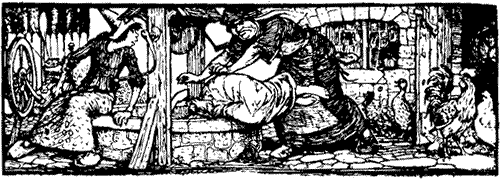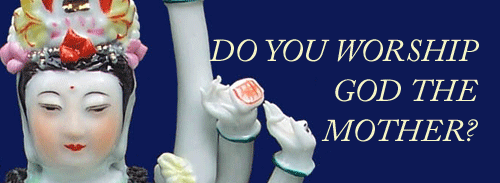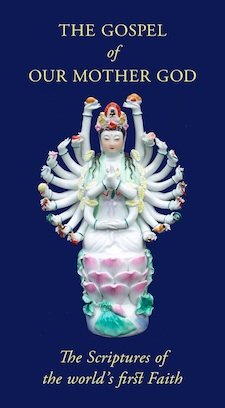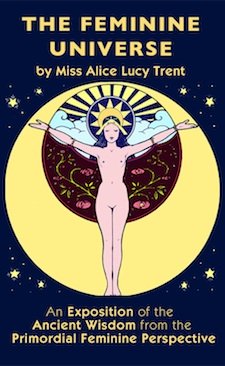Mother Holle
or Cliona and the Three Caskets

We have already discussed Mother Holle as a folk-memory of the Supreme Mother God. We now present a version of one of the most famous stories about her.
In this story, as is usual in folk traditions, Mother Holle, or Hulda, appears as something like a mortal woman, but the deeper meaning of the story is examined in our complete metaphysical analysis.
Mother Holle
ONCE UPON A TIME, long, long and long ago, when the world was young, the maiden Cliona lived with her stepmother and stepsister in the heart of the forest.
Now Cliona was as lovely a sweet-tempered child as one could ever hope to meet, and it was small wonder that all the neighbors loved her dearly. Yet her stepmother loved her not at all, but favored her own daughter, who was as ugly as her own self. She praised her when she behaved ill and encouraged her when she was selfish until the child grew as greedy and bad-mannered as Cliona was the opposite. And as year followed year, the difference between the sisters grew more evident.
At last the stepmother could bear no longer to hear the neighbors sing the praises of Cliona while for her own child they had nothing but abuse and criticism. So she called the two maidens together and set them to spinning on the edge of the well in the courtyard.
"Woe to her whose thread breaks first," was her warning, "for I shall cast her into the depths." But you may be certain that it was to her own daughter she gave the fine strong flax and to Cliona the coarse stuff which the meanest of the village spinners had rejected. So it was that Cliona's thread snapped the soonest, for all that she was the more skilful, and her stepmother came up behind her and threw her into the well. "There's an end of you, wench," she called after her.
But she was wrong, for it was only the beginning.

Cliona tumbled, head over heels, down and down it seemed for ever – but at last her feet touched solid earth and she stood beneath a clear blue sky. It was a strange land and a bright and beautiful country wherein she found herself. She walked a little way, until she came upon an old hedge which looked so frail that it would scarcely support a wren, and the hedge cried out:
"Maiden, strange maiden, step lightly over me, for I am old, so old that I have not much longer to live."
"That will I do with a heart and a half," answered Cliona, and skipped over the hedge so lightly that not a twig trembled. "My blessings go with you, gentle maiden," said the hedge gratefully, and on Cliona walked, down a path between tall and graceful trees.
Ahead of her at last she saw an oven standing over an open fire, and as she came closer, the oven cried:
"Maiden, strange maiden, take out my loaves. They have been baking for seven long years and will be burnt except you make haste."
"That I will with a heart and a half," answered Cliona and took out the loaves laying them gently on the grass side by side, though her heart was like to break with hunger from the smell of them.
"Take a loaf and welcome, gentle maiden," said the oven, "and my blessing go with you."
So Cliona chose the smallest loaf and went her way.
A long and weary way it was, and the sun past her height before she came to a meadow where a cow grazed with a pail hung on her horns.
"Maiden, strange maiden,” said the cow, "please milk me, for I have not been milked these seven long years."
Mother Holle continues after break
"That I will with a heart and a half," answered Cliona, and milked until the pail was quite full.
"Drink what you will, throw the rest over my hooves, and hang the pail upon my horn again," said the cow, and this Cliona did, thanking the cow for her kindness with a kiss.
"My blessing go with you, gentle maiden," called the cow as Cliona walked on across the meadow.
Soon it was then that Cliona came to a cottage where an old crone sat in the sunlight.
"Rayati, good mother" called the maiden politely, making reverence and the crone looked at her through bleary eyes.
"Well, it's manners you have indeed, but I wonder will you be good enough to comb out my hair before you go on."
"That I will with a heart and a half," answered Cliona, and gently combed the thin white hair until the sunlight spangled it.
"You have done well, gentle maiden,” said the crone. "If you are seeking a position, you will find one with Mother Holle at the farm over the hill, and my blessing go with you,"
Cliona was sweet in her thanks.
Over the hill was a great farmhouse where a silver-haired maiden sat spinning. Her teeth were so great and long that Cliona was tempted to run away, but Mother Holle said:
"I am Mother Holle. When I shake out my feather-bed, the snowflakes fly in the world. Be you not afraid, for you may work for me; and if you work well, you shall be rewarded."
And so Cliona was engaged to milk the cows and sift the corn. She ate well and slept well in the softest of beds and wondered at her good fortune.
At first light she was up to milk the cows. She gave them sweet hay for their eating and fresh straw for their standing, and was so gentle and sang so calming a song that the cows were quiet and willing at the milking, and the pails soon filled.
All at once a crowd of cats surrounded Cliona.

”It is milk you are wanting," she said, and found saucers for all of them.
At noon, when Cliona was sifting the corn through a sieve, there was a sudden rustle of wings and a flock of sparrows descended around her.
"It is corn you are wanting," she said, and scattered them a fine handful over the ground.
All in all, Cliona worked with a will and every creature was her friend. The cows, well-tended, gave milk to overflowing, as sweet as a summer's day and the flour from the corn she sifted was as fine and white as virgin snow.
Mother Holle was well pleased with her servant and wanted to make a trial of her skill. So one day she gave Cliona a sieve and bade her use it to bring water from the stream.
Cliona tried and tried again, but she could not make water stay in the sieve. Then she heard a whirr of wings and piping sparrow voices singing:
"Ashes, ashes!" Cliona understood and ran back to the kitchen to fill her sieve with ashes, and then it held the water perfectly.
"This is wise work beyond my expectation," said Mother Holle. "Perhaps it is that you had help."
But Cliona said not a word and continued with her work as before.
After a full moon's passing, Mother Holle gave her a black thread and a white thread.
"Wash these in the stream until the black is white and the white black," Cliona was told.
She went again to the stream, but had no more success than before. She was all for giving up in despair when again she heard the sparrow voices:
"Black to the east, white to the west," they repeated, and Cliona, understanding, drew the black thread against the current to the east and the white with the current to the west, and the colors changed at once.
Mother Holle could scarce believe her eyes and said:
"It is well and wisely done, but I wonder whence the wisdom came." But again Cliona said nothing.
The moon waxed and waned before Cliona was set a final task by Mother Holle, who gave her the threads she had washed and told her to weave them into cloth by sunset.
Simple enough it seemed, but the threads twisted and tangled, and all Cliona's skill was of no avail.
"This I shall never do," sighed Cliona and wept aloud. But the cats came and pushed themselves against her lovingly.
"Let us do it, little mistress," they cried, and taking her place at the loom they wove so fast and so skilfully that the cloth was woven in an instant and was fit for a princess's robe, so soft and smooth it felt.
"This passes my understanding," declared Mother Holle in seeming wonderment. "What help have you had that you could do this?"
But Cliona gave no answer.
When a year and a day had passed, it was time for Cliona to leave the farm. It was with tears in her eyes that Mother Holle bade her farewell.
"You must choose one of the three caskets in the upper room as payment for your work," she said, "but do not open it until you reach the place in which you want it to stay."
Cliona went to the upper room and saw three caskets, one of gold, one of silver and one of lead. She picked them up in turn, but was at a loss which to choose when the cats filed in through the open door.
"Leave the gold and leave the silver. Choose the lead," they mewed insistently, and so it was the lead casket that Cliona tucked under her arm.
Cliona made farewell to Mother Holle, the cats, the cows and the sparrows; and all were heavy with sorrow at the parting.
She trod the path that had brought her to the farm, and the old crone gave her greetings and a cake for her journey, the cow gave her milk and the oven a fresh, crusty loaf.
So with a full heart and a merry she stepped lightly over the hedge, and in an instant – though how it happened was a thing she never could tell – there she was sitting on the edge of the well in the courtyard of her stepmother's house.
You may be sure that her stepmother and stepsister were not over-pleased to see her still alive. Indeed, so far from it were they that they drove her out with brooms to live in the hen-house.
There Cliona swept the floor and dusted away the cobwebs until everywhere was bright and clean; then it was that she opened the casket and all in a moment there was a glow and shine about the place that brought everyone running, for the casket was full to the brim with jewels and treasures, some big, some small, and all as radiant as the stars of heaven.
So enraged with envy was the stepmother that she pushed her own daughter down the well, instructing her with threats to bring back a prize as great if not greater.
All was as before, save that the maiden was not the same. For she did not heed the hedge's appeal, but pushed through, breaking branches and tearing roots; she took the largest loaves from the oven and left the rest to burn; after drinking her fill of milk she spilt the rest on the ground and kicked the pail across the meadow; and to the old crone she was as rude as her tongue could fashion, which was not a little.
Mother Holle continues after break
Thus, then, although she found the farm herself and was engaged by Mother Holle to milk the cows and sift the corn, it was curses and not blessings went with her.
Never was work more badly done, when it was done at all, nor time more wastefully spent; and all the creatures suffered from the stepsister's ill-treatment.
Mother Holle was hard put to keep her temper with the sullen and lazy child, and at last decided that it was time to make a trial of her skill in other work.
"You cannot tend cows, nor sift grain from chaff," she told her servant, "but take this sieve and fill it from the stream and bring it back to me."
Without the sparrows' advice – and they had long flown away – she found the task beyond her and was angry that she had been asked to do it.
Nor was Mother Holle any more pleased, but she let her be. A month passed, and she made trial of her servant again with the black and white threads, but with no more success than before; nor could she weave the cloth, but at sunset was found sleeping amid a dirty tangle of wool.
"It is as I expected," Mother Holle said. "There is nothing in the wide world you can do." And she let her go her own way and never troubled her again.
After a year and a day, Mother Holle told her servant to begone and that quickly, and that she might choose one of the caskets in payment for the little work she had done.
It was for nothing else that the maiden had been waiting, and she lost no time in choosing the golden casket, which was so splendid without that it must surely be filled to the brim with glorious treasures that would put to shame her sister's splendor.
But before her was a hard and bitter journey, for she received neither greetings nor cake from the crone; the cow kicked up her heels and fled at her approach, and the loaves in the oven were all burnt black. It was tired and hungry and thirsty she was when she reached the hedge, and the brambles tore at her as she stumbled through.
For all that, her mother had eyes for nothing but the casket when she reached home, and she admired it and praised her daughter's cleverness until the journey was quite forgotten.
They settled the splendid box in the middle of the finest room in the house and opened it triumphantly. But the glow which suddenly shone in the room was not jewel-light, but living flame which licked about the walls, until all was lost and consumed, mother, daughter and all.
So that was an end of them indeed, and nobody missed them at all. But Cliona lived happily in her beautiful hen-house for the rest of her long, long life.
See also:
The Secret of the Three Caskets: An in-depth metaphysical commentary on this story.
Frau Holle: the Supreme Mother God in Fairy Tale tradition
Mythology and Folklore: Fairy Tales from Eternity
Send us your questions or comments
Chapel of Our Mother God Homepage
All written material at the Chapel of Our Mother God is copyright. Should you wish to reproduce any portion please contact us for permission.
Facebook or Twitter
This section:
Stories and Symbols
Gospel of Our Mother God
The Gospel of Our Mother God is a collection of inspirational texts, prayers and daily inspiration for the Mother-Faith devotee or household.
The Feminine Universe
The Other Philosophy
Everything you have ever heard comes out of the patriarchal world-view. Its materialism, its religion, even its feminism. Here is the other way of seeing the world; the natural way: the way that everyone saw things before patriarchy and will again when patriarchy is long forgotten.


